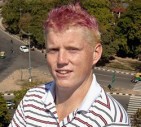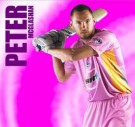Henry Olonga Interview
James Nixon |CW: You started your international career with the honour of being the first coloured player to represent Zimbabwe, taking 1/27 on debut. Do you remember the feeling of being part of Zimbabwe’s first ever Test victory?
HO: It was very special to make my debut as the first black player. It was also bittersweet as I had problems with my action and also got injured, to have played in the team that won Zimbabwe’s first test match was truly exhilarating and looking back was one of my fondest victories.
CW: Could you describe the feeling of your first Test wicket when you dismissed Saeed Anwar?
HO: It was a terrible ball and I didn’t deserve a wicket at all. I was more surprised than anything. I thought to myself, this is bizarre I had been told how difficult test cricket was and here was a top batsman tipping a leg side nothing ball. I was to later discover that test cricket was indeed very tough.
CW: Was this, to an extent, negated by being called for throwing?
HO: Yes to some extent but it was still a great win.
CW: You took your first Test five-wicket (5/70) haul against India at Harare in 1998/99. Was it at this stage where you really felt you belonged at the top level, or had you always believed in your ability?
HO: I always knew I had talent but like so many others who have come and gone ,I had to learn that it’s not what you have but what you do with it. It was a hard earned five wickets and yes it did assure me that I could play at the highest level.
CW: You were awarded man-of-the-series following Zimbabwe’s maiden Test series win, against Pakistan in Pakistan. By this stage of your career, you had begun to marry two crucial ingredients pace and accuracy. Did you see yourself primarily as an out-and-out fast bowler, or were you someone who tried to slow down and focus on accuracy?
HO: In that particular series I bowled as fast as I have ever bowled. We played on green tops and the wickets were fast and bouncy. I bowled flat out in that series. I guess you could say that it all came together. I injured my foot as well and needed an operation to remove a growth. I never came back the same bowler after that operation.
CW: After not playing a match in the 1996 World Cup tournament (you were selected for the final match, yet nobly opted out due to lack of cricket), you enjoyed a solid 1999 campaign taking 8 wickets. This included a brilliant last over in the pool match against India where you won your side the match.
HO: Zimbabwe advanced to the Super Sixes of this tournament. Do you rate this as Zimbabwe’s finest hour in international cricket?
Our finest hour in my opinion was our victory against South Africa at Chelmsford in the WC. It took a massive effort to pull off a stunning result. In my opinion the closest to a perfect game by Zimbabwe and also considering the circumstances, a fairy tale ending.
CW: Following World Cup 1999, you took part in a triangular ODI series in South Africa as part of the Zimbabwean squad to play the hosts and England.
HO: In a match against England in this series, you snared your career-best ODI analysis of 6/19. You seemed to bowl almost the perfect spell for a fast bowling. Was it a case of everything going right on the day for you?
It was I guess. We bowled second under lights at Newlands which does help a lot.I guess one still has to bowl in the right areas though.
CW: Throughout your career, you had some trouble with injuries. Did this frustrate you at times, or did you feel it was part-and-parcel of being a fast bowler?
HO: The bane of my career by far. I never ever achieved my full potential because of injury. Injuries in turn would affect my drive. I worked hard at my flexibility and strength but it was so frustrating to see that despite my efforts for the most part, I never overcame my achilles heel.
CW: Who were your heroes as a youngster growing up in Bulawayo?
HO: Wasim Akram, Waqar Younis and God
CW: Do you see World Cup 2003 as a positive or negative experience?
HO: It was positive in that I was able to make a stand with one of Zimbabwe’s favourite cricketers and condemn what we believed was wrong in our land. It was negative because I lost just about everything I knew as familiar. I lost my career, my home and even some friends. But It’s positive because I have received nothing but warmth in the UK and had so many helpers who have come to my aid. I am grateful to the likes of David Folb and many other people I can’t thank enough for their assistance.
CW: You’ve been named by many people as heroic, and you are a man admired world-wide. Do you find it difficult to comprehend that you have gone from a humble fast bowler with strong values to a man respected in all corners of the earth?
HO: Yes at times I find the admiration a little overwhelming. I mean I did what I simply believed was the right thing to do and others have in the past given or sacrificed more. I feel guilty that I have received so much attention and others whose efforts are more practical and more far-reaching do not receive their due praise. In one sense I suppose it is humbling in itself that we represent a multitude of people who share the sentiments about the country, but did not have the avenue to voice their opinions. So in one way we were simply voices that came with a message that millions of others wished they could have given.
CW: You are also a highly talented musician, having recorded a number 1 album in Our Zimbabwe. Will music play a large role in your future life, or do you see it as more of a hobby?
HO: I have little choice now I guess. My knees are worn, my back is packing up and my cricket kit may lie idle for a few years now. I always loved music and always sung. Now I guess I am making the natural transition to something I was always going to do. My career was always going to end sooner or later. That time comes for every cricketer.
CW: You were recently awarded life membership to the MCC alongside Andy Flower, a rare honour. Did this make you feel like you had the support of the cricketing world, and that your brave act has not been forgotten?
HO: Yes. Like I said, I am glad that we were merely representatives of a whole host of like-minded people that would have done the same given the chance. The MCC honour completely blew me away. I was utterly dumbstruck because it was a very significant show of the strong feelings people have concerning the situation in Zimbabwe.
CW: Do you feel your cricketing career is over, or is there a chance we will see Henry Olonga play regularly again?
HO: Unfortunately I think time is passing me by. I feel a little older every day and recently had my fourth operation ,specifically on my troublesome right knee. I watch my team-mates play and at times yearn that I could still be out there in the heat of battle but I am afraid that I lack two things. A young body to serve me and the desire to play in a team that has to ignore the implications of the political meddling in Zimbabwe Cricket. If there certainly isn’t meddling then the fact that the patron won’t send me a Christmas card may be enough .Some have asked me if I may consider returning in a post Zanu PF regime .The truth of the matter is I simply don’t know.
Here are some questions from Cricket Web members
David Lewis: How come you didn’t play in the English CC last summer, and are you signed up with a county for next year? Also, do you plan to settle in another country for the required four years to play Test cricket?
Didn’t play this year and won’t next year. Won’t play Test cricket again I fear.
Peter Young: In light of your Christian beliefs, what are your views on ‘sledging’ and the banning of Shoaib Akhtar over his behavior towards Paul Adams? Should sledging be stamped out altogether in international cricket?
I believe that there are moments on a field where tempers flare. But Cricket is a unique sport that has a unique spirit. Players ought to always conduct themselves in accordance within the spirit of the game. Sledging isn’t desirable, but it does happen. I always thought it unnecessary in my game but other people have different temperaments. My beliefs prompted me to stay out of it yes, but I understand how it can happen.
Marc Robbins: As a Fast Bowler, what is your rating of the current English Seam attack – do you think they are missing a true leader with Gough retiring, or is one of the up and coming players (for instance Steve Harmison) taking that mantle?
One will always come through eventually. Harmison is doing a fine job at the moment. The attack is thin on experience but time will deal with that.
Sangrah Bhatia: Zimbabwe have an extremely young team, but an extremely able team. Do you think that this current crop of young Zimbabwean players such as Andy Blignaut, Tatenda Taibu and Mark Vermeulen can help Zimbabwe become a potent cricketing force in the near future and like Sri Lanka win a World Cup?
They are young but in time they will mature. When that happens hopefully once again we will have a good nucleus of players, they could then be more competitive.
Sangrah Bhatia: Zimbabwe always seem to ‘rise to the occasion’ in every World Cup. Being part of many Zimbabwean World Cup campaigns, how has the Zimbabwean approach been different in World Cups compared to the normal annual schedule of International Cricket?
We haven’t done anything out of the ordinary save for prepare with a little more intent.
Sangrah Bhatia: In your opinion, who is the ideal man to lead Zimbabwe into the 2007 World Cup and into the future?
Heath Streak, the current captain. If of course he is still fit.





Leave a comment